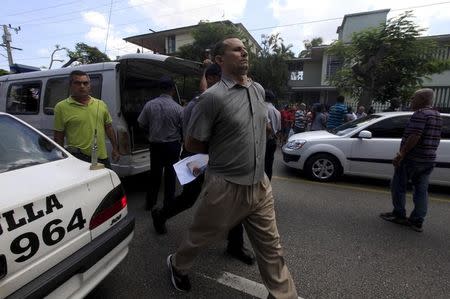On third pope visit, Cuba and dissidents fight same battle
By Daniel Trotta HAVANA (Reuters) - The popes change, but the images are similar: plain-clothed Cuban security agents wrestling with dissidents to prevent them delivering messages to the pontiff. Cuba's small but vocal dissident groups have become a focal point of Pope Francis' visit to the country this week as police have detained dozens of people to stop them attending papal events. For critics of the Communist government, the Roman Catholic Church has kept too quiet about repression and is again missing an opportunity to make a stand for democracy and human rights. For the government and its defenders, the dissidents are a tiny minority with little public support and financed indirectly by the U.S. government. Like Pope John Paul on his Cuba visit in 1998 and Pope Benedict in 2012, Francis has avoided rebuking his hosts for harassing political opponents.7 "They talk about the glory of God in heaven, but say nothing about the hell for us on earth," Jose Daniel Ferrer, leader of the Patriotic Union of Cuba, the country's largest dissident group. Two prominent dissidents said they were detained on Sunday even though they were invited to attend evening prayers with Francis at the Havana cathedral. In a separate incident, a man broke through security to reach Francis' side before he celebrated Mass in Revolution Square on Sunday, managing a few words before he was bundled away. Cuba's Catholic Church, which has fought hard to win back some of the influence it lost after the 1959 revolution, steers clear of partisan political battles, choosing to exert influence with the government privately. Critics say it could and should do more. "I understand Church subtlety, and we all know the Church is playing the long game, but by this time, the third papal visit, it has to use its moral authority to address a situation that is fundamentally incompatible with the values the Church promotes," said Jose Cardenas, who was a U.S. State Department and National Security Council adviser under former President George W. Bush. Cuba's constitution permits free speech but only "in accordance with the aims of a socialist society," validating the repression of dissidents who are often stopped for simply attempting to attend a demonstration. SHORT-TERM DETENTIONS The methods of harassment have changed. Once sentenced to prison terms, dissidents are now mostly detained for a few hours or days at a time. Police sometimes hold them for questioning at the station. Other times, dissidents say they are taken out of town and made to stand in the hot sun, or inside a sweltering bus. During Francis' visit, activists say several dozen have been trapped in their homes, guarded by security agents. The Cuban Commission of Human Rights and National Reconciliation reported 768 short-term detentions last month, the highest monthly total this year. Most Cubans are skeptical about the dissidents, believing they are largely motivated by a slice of the $20 million to $30 million a year in U.S. government funds that are for democracy programs in Cuba. Some of the money is funneled through non-governmental groups that fund the dissidents. "Dissidents in Cuba may be seen abroad by some as brave freedom fighters because much of the mainstream media describe them in this way. It is part of what I call continuous disinformation with regards to Cuba," said Arnold August, a Montreal-based author who sees Cuba as more democratic than most analysts. The high-profile Ladies in White, who demonstrate after Mass every Sunday, have acknowledged that their activists receive $30 each per march, more than the average monthly Cuban salary. Still, some dissidents had hoped for a bold admonition of Communist rule from Argentine-born Francis, the first Latin American pope. It has not yet come and he leaves Cuba for the United States on Tuesday. (Reporting by Daniel Trotta; Editing by Kieran Murray)



